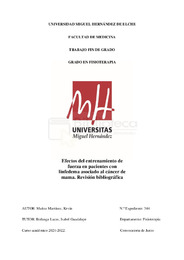Por favor, use este identificador para citar o enlazar este ítem:
https://hdl.handle.net/11000/28221Registro completo de metadatos
| Campo DC | Valor | Lengua/Idioma |
|---|---|---|
| dc.contributor.advisor | Birlanga Lucas, Isabel Guadalupe | - |
| dc.contributor.author | Muñoz Martínez, Kevin | - |
| dc.contributor.other | Departamentos de la UMH::Patología y Cirugía | es_ES |
| dc.date.accessioned | 2022-11-04T08:42:01Z | - |
| dc.date.available | 2022-11-04T08:42:01Z | - |
| dc.date.created | 2022-06-20 | - |
| dc.identifier.uri | https://hdl.handle.net/11000/28221 | - |
| dc.description.abstract | Introducción: Existe una gran controversia en cuanto al rol que puede representar el ejercicio de fuerza en el tratamiento del linfedema, más en concreto, en el linfedema asociado al cáncer de mama (BCRL). Antiguamente se pensaba que realizar ejercicio levantando cargas con el brazo afecto podía exacerbar el linfedema y sus síntomas asociados. Es por ello que he decidido realizar esta revisión, mostrando lo que dice la evidencia científica respecto a este tipo de intervenciones. Objetivos: Conocer los posibles efectos que podría tener un programa de entrenamiento de fuerza en el linfedema asociado al cáncer de mama. Materiales y Métodos: Se realizó una revisión de la literatura empleando las bases de datos Pubmed, Cochrane y PEDro. Seleccionando aquellos artículos que hablaran sobre linfedema y entrenamiento de fuerza. De los 122 artículos, tan solo 9 cumplieron con los criterios de inclusión y exclusión elegidos. Resultados: El entrenamiento de fuerza podría tener grandes beneficios para las personas con BCRL, como son la ganancia de fuerza y masa muscular, el aumento de la funcionalidad y movilidad, la mejora de la calidad de vida y sintomatología e incluso la reducción del volumen del linfedema. Conclusiones: El entrenamiento de fuerza en el BCRL, independientemente de la carga, es una intervención segura y podría conllevar grandes beneficios. | es_ES |
| dc.description.abstract | Background: There is a great dispute with regard to resistance training and how it may affect lymphedema treatment, especifically, in breast cancer-related lymphedema (BCRL). Often the use of the affected limbs when lifting heavy weights was associated to lymphedema and its symptoms´ exacerbation. Hence my decision to carry out this investigation, showing what the scientific studies have clarified so far with regard to these type of interventions. Objectives: Find out the possible effects and/or consequences of resistance training in breast cancer-related lymphoedema (BCRL). Material and Methods: Databases such as: Pubmed, Cochrane and PEDro were used when consulting studies related to the aforementioned objective. After going through 122 articles related to lymphedema and strength training, only 9 were chosen, for only these 9 met the requirements and could be used taking in account the criteria of this study. Results: Resistance training has proven to benefit greatly patients suffering from BCRL. In fact, these patients develop more muscle mass and more strength. As for their quality of life, it also improves significantly due to an increase in the limb´s functionality, and as a consequence, in the patient´s mobility. Finally, the volume of the limb affected by lymphoedema also decreases. Conclusions: Resistance training in patients suffering from BCRL, regardless of the amount of weight lifted by the patient, is a safe intervention and it can prove to benefit the patient to a great extent. | es_ES |
| dc.format | application/pdf | es_ES |
| dc.format.extent | 18 | es_ES |
| dc.language.iso | spa | es_ES |
| dc.publisher | Universidad Miguel Hernández | es_ES |
| dc.rights | info:eu-repo/semantics/openAccess | es_ES |
| dc.rights | Attribution-NonCommercial-NoDerivatives 4.0 Internacional | * |
| dc.rights.uri | http://creativecommons.org/licenses/by-nc-nd/4.0/ | * |
| dc.subject | Linfedema | es_ES |
| dc.subject | Entrenamiento de fuerza | es_ES |
| dc.subject | Cáncer de mama | es_ES |
| dc.subject.other | CDU::6 - Ciencias aplicadas | es_ES |
| dc.title | Efectos del entrenamiento de fuerza en pacientes con linfedema asociado al cáncer de mama. Revisión bibliográfica | es_ES |
| dc.type | info:eu-repo/semantics/bachelorThesis | es_ES |

Ver/Abrir:
TFG MUÑOZ MARTINEZ KEVIN.pdf
505,92 kB
Adobe PDF
Compartir:
 La licencia se describe como: Atribución-NonComercial-NoDerivada 4.0 Internacional.
La licencia se describe como: Atribución-NonComercial-NoDerivada 4.0 Internacional.
.png)